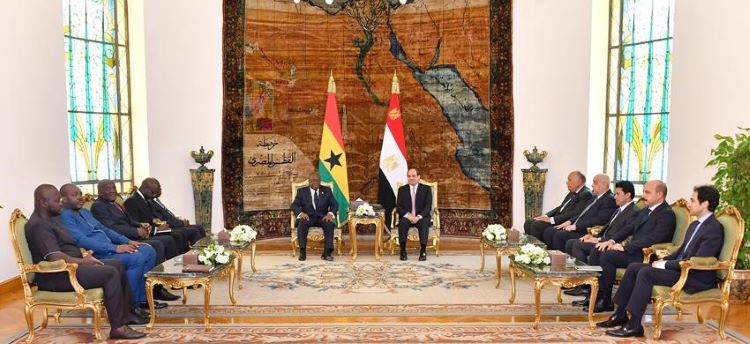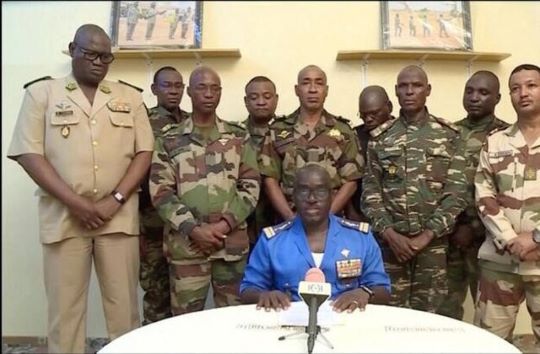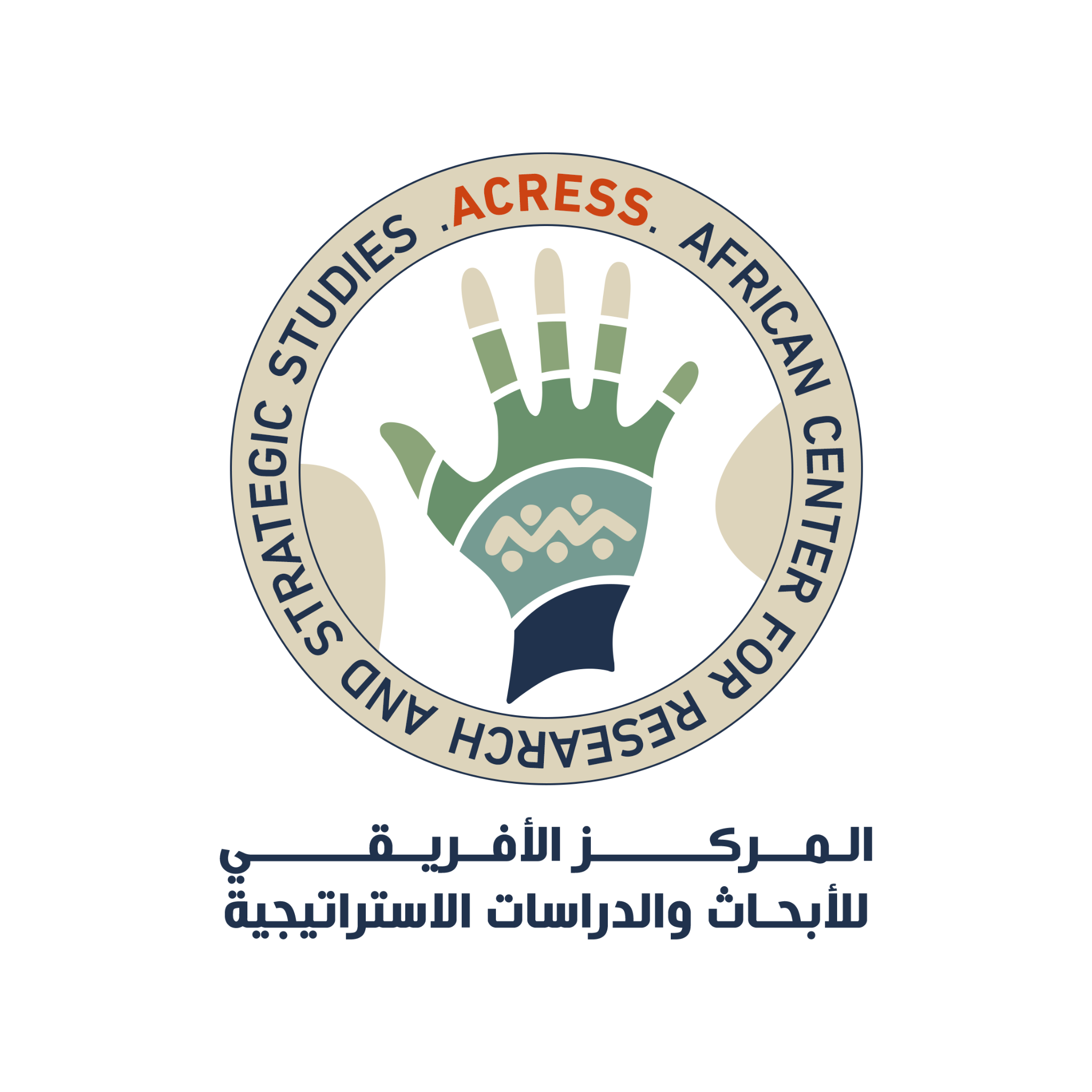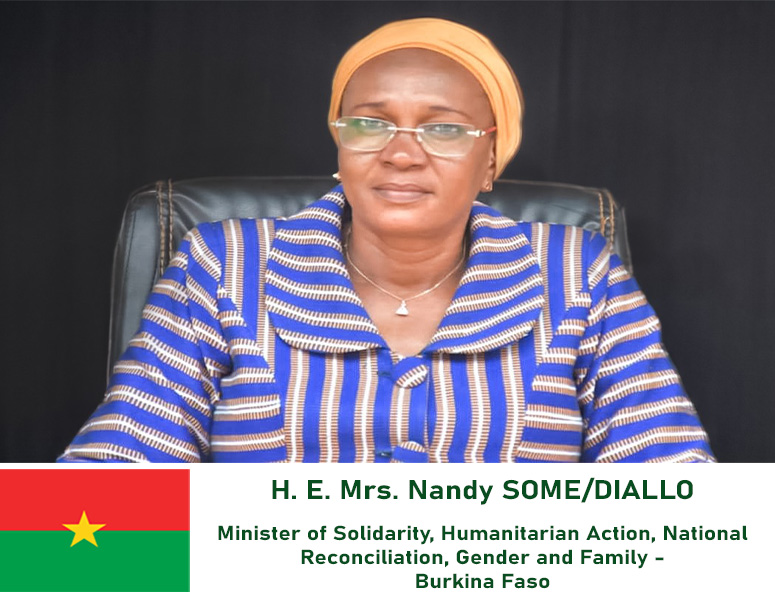
7 Sep. 2024
An exclusive interview for the African Center for Research and Strategic Studies (ACRESS), the Embassy of the Republic of Ghana in Egypt talks about the most important steps taken by the Fourth Republic in Ghana, especially holding of a regular election in stable political environment and democratic governance that the country has witnessed since 1992. In addition to shedding light on a number of achievements in the education sector, women’s empowerment. Finally, talking about the future of bilateral relations between Egypt and Ghana. Here is the text of the interview:
Brief Historical Background: Ghana, formerly known as the Gold Coast, is located on the West Coast of Africa. It is bordered to the East by Togo, to the West by La Côte d’Ivoire, to the North by Burkina Faso and to the South by the Gulf of Guinea. With a current population of approximately 33 million, it is one of the most thriving democracies in Africa. It attained political independence on 6th March, 1957; the first country in Sub-Sahara Africa to do so. After a number of political upheavals, the country was ushered into its Fourth Republic in 1992 and has, for the past thirty-two years, had uninterrupted democratic governance, earning for itself due recognition as a bastion of democracy in Africa.
Like all countries, the symbolic national identity of Ghana is the National Flag which is made up of a horizontal tricolor of Red, Gold and Green, emblazed with a five-pointed Black Star in the middle. The Red color represents the blood of our forebears who led the struggle of independence; The Gold color represents the wealth of the nation whilst the Green symbolizes Ghana’s forests and natural wealth. The Black Star in the middle symbolizes the Lodestar of African Freedom and Emancipation from colonialism.
Ghana’s first President was Osagyefo Dr Kwame Nkrumah who was the de facto leader of Government Business (Prime Minister) of the Gold Coast from 1952 until Ghana attained Independence in 1957. As a matter of historical interest, Egypt was one of the first countries to recognize Ghana’s Independence. A strong bond of friendship was struck between President Gamal Abdel Nasser of Egypt and Osagyefo Dr. Kwame Nkrumah of Ghana. The Ghana-Egypt relation was further boosted by the marriage of Dr. Kwame Nkrumah to Fathia Nkrumah (born Fathia Halim Rizk) of Egypt. They had three children namely Gamal Nkrumah (born 1958), Samia Nkrumah (born 1960) and Sekou Nkrumah (born 1964).
Foreign Policy: The 6th of March is a seminal moment in the annals of Ghana as it symbolizes the turning point in the country’s history, having set the tone for the beginning of a dynamic, vibrant, and young nation. This historic milestone had reverberated across the African continent and led to the eventual emancipation of the entire continent. Indeed, in the Proclamation of Independence by Ghana’s first leader, Osagyefo Dr Kwame Nkrumah, he announced that “The independence of Ghana is meaningless unless it was linked up with the total liberation of the African continent”. This statement became the plank of Ghana’s foreign policy tenets and a new epoch for the decolonization and total liberation of Africa. Undeniably, the pioneering collaborative work between the two countries in the late 1950s was instrumental to the formation of the Organization of African Unity (OAU), now the African Union (AU).
Beyond its Africa agenda, Ghana’s contribution to the United Nations and other multilateral institutions is highly recognized as it continues to work in cooperation with friendly countries and international bodies in the promotion of peace and security. As an example, in January, 2024, Ghana completed its two-year tenure as a Non-Permanent Member of the United Nations Security Council (UNSC), the fourth time Ghana was elevated to that platform since Independence. During its tenure Ghana, used the opportunity to champion issues of regional peace and security as well as the need for lasting solution to insecurity in the Sahel region and Peacekeeping.
Political Governance: The period following Ghana’s independence has been characterized by several forms of governments, culminating in its Fourth Republic in 1992. Since the Fourth Republic, the country has made great strides in its dealings with the comity of nations and has continued to forge a closer, fruitful collaboration in bilateral and multilateral engagements with Egypt and other friendly countries.
The Fourth Republic witnessed the introduction of a multi-party democratic governance, characterized by the rule of law, human rights and economic development. The right of citizens to express diverse opinions and the space to accommodate same, especially when a political party amply demonstrated in the Parliamentary debates, where issues of national interest are dispassionately debated for the betterment of the nation.
The organization of periodic free and fair elections, a core tenet of democracy, has been a hallmark of Ghana’s Fourth Republic and so far, the country has organized six successive elections, adding to its democratic credentials on the Continent. These elections are held every four years, and 2024 marks another election year in the country’s democratic cycle.
The main oversight body is the country’s Electoral Commission, and several activities go into the planning of elections. The State ensures adequate preparation to enable the citizenry to exercise their franchise. There is active collaboration between other state agencies, as well as relevant stakeholders such as, the Security Forces, Civil Society Organizations, the Press and the Inter-Party Advisory Committee, among others who engage in dialogues and build consensus before, during and after elections in Ghana.
Ghana’s Electoral Commission ensures that it opens the electoral register to allow new entrants/eligible citizens who turn 18 years, to register and to vote. The register is subsequently displayed for the public to check their names to ensure the accuracy of the data before the elections. In addition, the Electoral Commission in conjunction with the National Commission for Civic Education (NCCE), undertakes extensive education to the public on their rights and responsibilities in any election year. Local and international election observers are also deployed during elections.
Media and Civil Society: The 1992 Constitution which ushered in the Fourth Republic opened the country’s media landscape and the media in Ghana have enjoyed unfettered freedom of expression and association. Thus, we have in Ghana several private radio and television stations as well as several newspapers. As a firm advocate of the freedom of the press, the country has witnessed great strides in media expansion and proliferation.
The vibrancy of Civil Society Organizations (CSOs) in Ghana’s Fourth Republic is evident in the provision of essential inputs to complement government policies. They serve as a valuable platform for public discourse on topical issues
Socio-Economic Policies: The Government of Ghana introduced a flagship project called the Free Senior High School policy to ensure equal nationwide access to secondary education. So far, the scheme has seen a rise in the enrolment of students into second-cycle institutions across the country [i], boosting the future needs of well-needed manpower. The improvement of Science, Technology, Engineering and Mathematics (STEM) education is also being prioritized as a potential catalyst to equip learners with requisite skills for socio-economic transformation of the country through investment in these sectors to foster national development and accelerate positive changes in the lives of the citizenry.
Ghana over the years has undertaken economic and social reforms towards securing a prosperous future, especially for the youth through investment in youth empowerment, skills training, start-ups, entrepreneurial skills training among others to accelerate positive changes in the lives of the citizenry.
As an example, the government has through the National Entrepreneurship and Innovation Program (NEIP) built the capacity of small businesses including second-cycle institutions to enable them to compete in local and international markets. Private sector financing has also been introduced to support businesses and start-ups in the informal sector through the Microfinance and Small Loans Centre (MASLOC).
With specific regard to the youth, the government in its bid to harness its potential for national development has implemented policies to address the problem of unemployment. The government, through the Youth Employment Agency (YEA), provides skills and vocational training at the Youth and Leadership Training Institutes (YLTIs). The Agency also launched the Steps Towards Employment and Productivity (STEP) Project, aimed at equipping the youth with artisanal skills.
A declaration of “the Year of Return” campaign in 2019 to encourage descendants of Africa to return to their roots also culminated in the facilitation of several activities and events, especially during the festive months of December and January. This has created an economy that has had positive effects on Ghana’s tourism and creative arts industry.
On gender equality and women’s empowerment, Article 17 Clause (2) of Ghana’s 1992 Constitution guarantees equal rights to all citizens and prohibits discrimination against all persons on the grounds of gender, race, color, ethnic origin, religion, creed or social or economic status. In this regard, several interventions have been implemented to promote gender equality. Ghana has adopted several of the international gender conventions and treaties in its legal framework and has made high-profile political appointments of women and encouraged their participation in politics and public life. For example, the position of Chief Justice from 2007 through to 2024 has mostly been occupied by women. In 2020 and 2021, The University of Ghana and the Kwame Nkrumah University of Science and Technology appointed their first female Vice Chancellors to run the affairs of the University. The Chief of Staff at the Presidency is also a woman, and in a previous administration from 2009-2013, the Speaker of Parliament was a woman.
Future of Ghana-Egypt Relations: Without doubt, the relations between Ghana and Egypt will continue to be strengthened in the coming years. In furtherance of this, relations have been characterized by cooperation in a myriad of areas culminating in the continual exchange of high-level visits between the two countries including the visit of His Excellency the President of the Republic, Nana Addo Dankwa Akufo-Addo to Egypt during the Climate Change Conference in 2022 in the historic city of Sharm El Sheikh. There was also the visit of Ghana’s Minister for Foreign Affairs and Regional Integration (MFA&RI), Hon. Shirley Ayorkor Botchwey to Egypt in June 2019 as well as the visit of several high-level Government officials to Egypt. It may also be recalled that Egypt’s immediate past Foreign Minister, H.E. Sameh Shoukry visited Ghana in May 2017 for talks aimed at boosting bilateral relations.
It is instructive to also mention that the Egyptian government continues to offer training programs to Ghanaians in diverse fields such as peace, security and diplomacy among others to enhance their capacity in these areas which are essential for sustainable and inclusive governance, particularly on our continent.
Ghana and Egypt have enjoyed strong cooperation on the political level. Even though economic, trade and investment cooperation have remained relatively low, it is, however, worthy of note that Egyptian companies continue to contribute significantly to Ghana’s economy and are a testament to the good business climate that exists in Ghana.
Ghana remains committed to working closely with Egypt at both the bilateral and the multilateral levels for the strengthening of their relations.
Ghana will also continue to work together with Egypt in all areas of cooperation and to encourage other businesses to take advantage of the opportunities that abound in the respective countries especially within the framework of the African Continental Free Trade Area (AfCFTA) Agreement, which has created access to an integrated African market of over 1.3 billion and a combined GDP of over US$ 3.5trillion.
[i] Second Cycle Institution means a Pre-Tertiary Institution other than a First Cycle Institution. The Secondary cycle can be either general (assumed by Senior High School) or vocational (assumed by technical Senior High School, Technical and vocational Institutes and a massive private and informal offer). Senior High school lasts three years and ends on the West African Secondary School Certificate Examination (WASSCE). But The WASSCE is needed to join a university Bachelor degree program.
 ar
ar
 fr
fr




